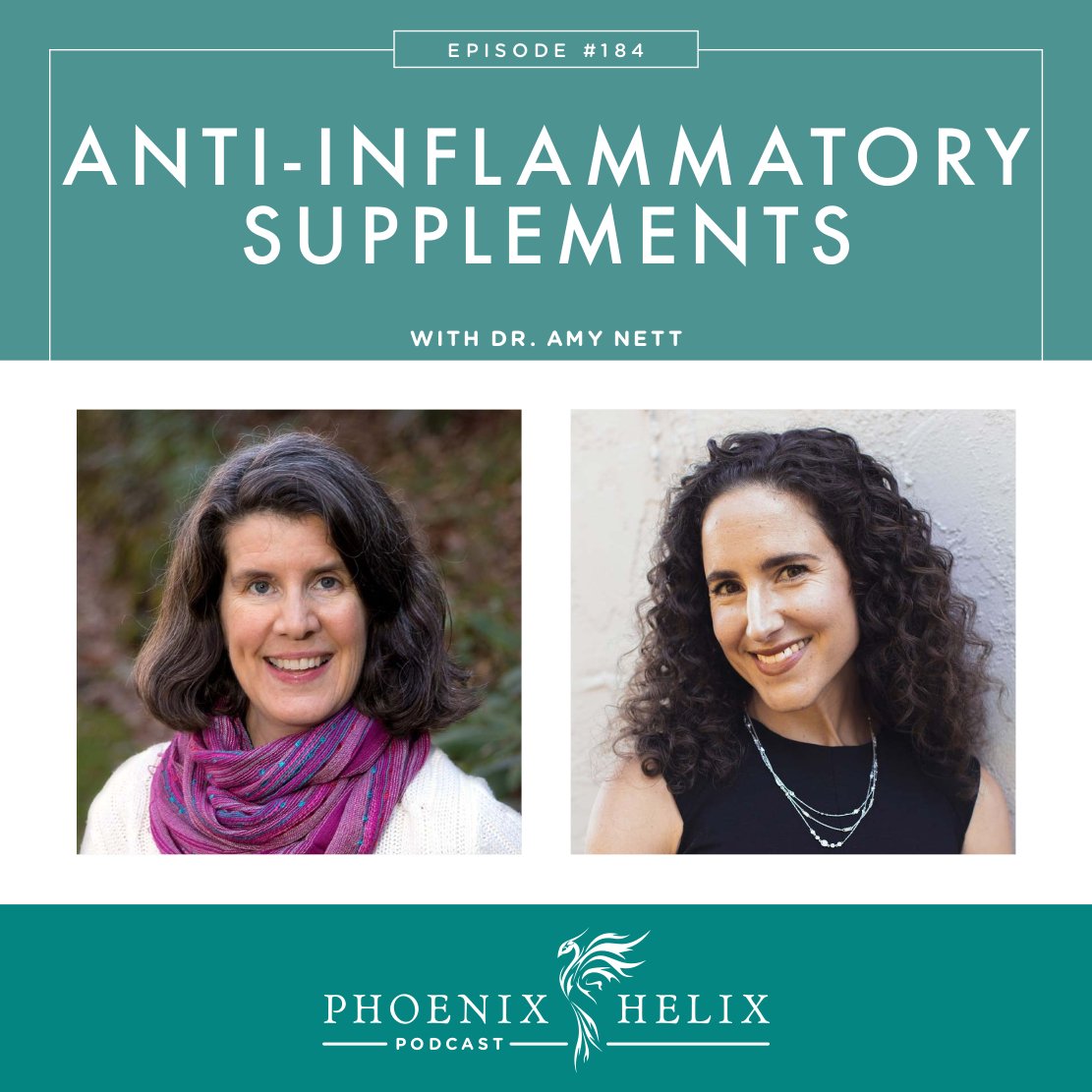Inflammation and Autoimmune Disease
Inflammation is a root cause for most chronic disease and it’s a major player in autoimmune disease. That’s why most doctors track inflammation on blood tests, because it often corresponds to autoimmune activity. Many patients find anti-inflammatory supplements helpful. Which ones have the most science behind them? How do they each work in our bodies to reduce inflammation? And how can you tell if one might be helpful for you? These are the questions we’ll be answering today, and we’re focusing on three popular supplements: fish oil, curcumin, and quercetin. My guest is Dr. Amy Nett. She’s a medical doctor whose specialty is functional and integrative medicine, and many of her patients have autoimmune disease.
Listen to the Show
- Subscribe to my podcast through your favorite podcast app: iTunes, Stitcher, Google, TuneIn, Spotify, Amazon, etc.
- You can also listen to the episode right here through the player below, and if you subscribe to my newsletter you’ll get notified of future episodes.
Podcast: Play in new window | Download
Show Notes
- Intro (0:00)
- A Quick Favor (2:05)
- If you know someone with autoimmune disease who could benefit from the Phoenix Helix Podcast, please share it with them. Word-of-mouth is one of the best ways for people to find me. For each of you who has done this already, thank you!
- Thank You To Our Podcast Sponsor – KC Natural (2:57)
- When you first begin the paleo autoimmune protocol, it can be pretty overwhelming. Most of your normal spices and condiments are off the table, and you’re desperately seeking flavor in the kitchen. KC Natural was created to fill that need. They started their company 6 years ago when they launched two different flavors of AIP-friendly barbecue sauce. Their company is located in Kansas City where BBQ is king! Since then, they have expanded their line to include AIP versions of ketchup, mustard, salsa, marinara sauce, and their latest – teriyaki sauce.
- Healthy convenience is hard to find in the AIP community, and I’m so grateful to KC Natural for being part of it. You’ll always find KC Natural in my pantry.
- If you’d like to stock up, KC Natural has a coupon for my listeners: 15% off with the code PHOENIX15. Place your order here.
- What Is Inflammation? (4:29)
- Acute inflammation is the immune system’s coordinated response to an injury, insult, or infection. Its goal is to heal and once achieved, the inflammation goes away.
- Chronic inflammation is when the inflammatory response continues when it’s no longer necessary. It’s an abnormal response and can be considered a dysregulation of the immune system. It’s strongly correlated with most chronic disease, including autoimmune disease. The higher the inflammation, the higher the disease activity.
- Resource: Ep. 158 – Inflammation with Dr. Will Cole.
- Fish Oil (8:17)
- Fish oil contains anti-inflammatory omega-3 essential fatty acids (EPA and DHA). They’re called essential because we have to get them through diet – our body doesn’t create them on its own. They reduce inflammation in multiple ways: (1) They contain anti-inflammatory compounds. (2) They compete with pro-inflammatory fatty acids for the same conversion enzymes in the body thereby reducing their number. (3) They decrease the pro-inflammatory cytokines often active in autoimmune disease (TNFa, IL-1, IL-6). (4) They may lower the number of CD4+T cells which stimulate an overactive immune response. (5) They also have metabolites that help resolve inflammation (and chronic inflammation is when inflammation continues unresolved). In addition to reducing inflammation, EPA & DHA also inhibit platelet aggregation (lowering the risk of blood clots).
- Omega-6 essential fatty acids often do the opposite – they increase inflammation and increase platelet aggregation. One in particular (AA) competes with EPA for the same conversion enzymes in the body. This is why we want more omega-3 fatty acids in our diet than omega-6. (The Standard American Diet is higher in omega-6.)
- Whole foods vs. supplements: Dr. Nett recommends getting your omega-3 from fish if possible. A 4-ounce serving of wild-caught salmon contains about 2500 mg of omega-3 essential fatty acids. She uses the acronym SMASH to remember the best fish sources, which are Salmon, Mackerel, Anchovies, Sardines, and Herring. They are all high in omega-3 yet low in mercury. For her patients who do take a supplement, she tells them to skip it on days they get a good serving of seafood.
- What to look for in a high-quality fish oil supplement: (1) The fish oil will either be in the form of an ethyl ester or a triglyceride. Triglycerides are more stable and have better bioavailability. Ethyl esters are more likely to oxidize and have a strong fish oil smell indicating rancidity. (2) Transparency: you want to know the source of the fish oil. It should be from a sustainable fishery and clean waters. (3) Testing: Companies that care about the quality of their supplements test for purity, contaminants, and oxidation. That information should be publicly available on their website. (4) When it comes to dosage, consult with your healthcare practitioner. Fish oil is a natural blood thinner, and it is possible to take too much. Dr. Nett recommends the lowest effective dose. She looks at symptoms, diet, and bloodwork before making a personalized recommendation. (5) High-quality supplements are more expensive, but they’re also more effective. When cost is a concern, Dr. Nett would recommend a lower dose of a high-quality supplement instead of a higher dose of a low-quality one. Dr. Nett’s favorite brand is Integrative Therapeutics Pure Omega.
- What are SPMs? Specialized pro-resolving mediators are signaling molecules formed in our cells by the metabolism of fish oil. They help orchestrate the resolution of inflammation. Most of the time, this is a natural byproduct of eating seafood or taking fish oil supplements, and our body makes all the SPMs it needs. However, SPM supplements can be helpful during autoimmune flares. Dr. Nett’s favorite brand is Metagenics SPM active. During flares, she’ll have patients stop their regular fish oil supplementation and instead take SPM active (6 softgels daily which equals 3 grams). She also prescribes these for acute back pain. It’s an expensive supplement but also very effective.
- Resources:
- Thank You To Our Podcast Sponsor – Functional Nutrition Alliance (30:58)
- Full Body Systems is their internationally acclaimed, 10-month online functional nutrition immersion training program.
- It’s designed by world-renowned educator, Andrea Nakayama. Many of you know her as one of my most popular podcast guests. Her unique way of working with patients often leads to results where other practitioners hit dead ends. This program teaches you to do the same.
- If you’re already trained as a health coach, nutritionist, or medical practitioner and want to more effectively help your clients break through healing plateaus, this class is for you!
- And if you’re an aspiring practitioner just getting started, this might be the only training you need.
- You’ll gain detailed knowledge of all the systems in the body, how they interact, how problems develop, and how to personalize diet and lifestyle recommendations for each unique client.
- Enrollment is currently open. To learn more, visit FxNutrition.com/Eileen.
- Curcumin (32:25)
- Curcumin is a polyphenol extracted from the whole food, turmeric. It’s a potent antioxidant and anti-inflammatory, and targets too many pathways in the body to list them all. Research shows it’s beneficial for many health conditions, including autoimmune disease, diabetes, chronic pain, and cancer. It also shows benefit for memory, attention, and mood. Dr. Nett recommends it for most of her patients, whether they have autoimmune disease or not.
- Whereas the benefits of fish oil can be gotten through whole foods, curcumin isn’t bioavailable naturally. This means when you eat a recipe that contains turmeric, most of the curcumin is not absorbed by your body, and what is absorbed is rapidly metabolized and excreted. Dr. Nett still recommends turmeric as a flavorful addition to your diet, but if you want medicinal benefit from curcumin, a supplement is necessary.
- Supplement companies have come up with many different methods for boosting the bioavailability of curcumin. One of the first methods developed simply added piperine (black pepper extract). BCM-95 is a patented formula that combines curcumin with curcumin oil to increase absorption. Meriva is a different patented formula that combines curcumin with phospholipids to increase absorption – phospholipids are a component of the cell membranes in our body. Theracurmin is a newer patented formula that combines nanoparticle curcumin in a colloidal dispersion, which not only increases absorption but also increases the half-life, meaning that the curcumin stays in the body longer. Dr. Nett has used all the formulas in her practice over the years, but her current favorite is Integrative Therapeutics Theracurmin.
- Potential side effects: Like fish oil, curcumin is a blood thinner, so just be aware of that. Overall, it’s well tolerated by most people, but if someone does experience negative side effects, it’s usually going to be a gastrointestinal symptom: nausea, constipation, or loose stools. In her practice, side effects seem to be more common with the curcumin-piperine combination (black pepper extract). There is also some concern that piperine might increase intestinal permeability, but Dr. Nett hasn’t seen research supporting that.
- Dosage will depend on the type of curcumin supplement and the underlying levels of inflammation. Dr. Nett will prescribe a higher dose during flares vs. a lower daily maintenance dose. She looks at bloodwork as well as patient symptoms when determining dosage.
- Resource: Turmeric and Autoimmune Disease.
- Quercetin (42:54)
- Quercetin is another polyphenol found in small amounts in many plants. It has antioxidant, anti-inflammatory, anti-carcinogenic, and antihistamine benefits (by stabilizing mast cells). Here are some of the ways it can reduce inflammation: (1) It inhibits cox and lox enzymes from creating inflammatory compounds. (Aspirin is another example of a cox-inhibitor). (2) It blocks TNFa mediated inflammation, which is often active in autoimmune disease. (3) It inhibits matrix metalloproteinases, which are involved in chronic inflammation and disease progression. There’s also early research showing potential benefit for many different autoimmune diseases. Quercetin may also be helpful for seasonal allergies, virus infections, and histamine intolerance.
- There isn’t enough quercetin in food sources to get a medicinal benefit. Like curcumin, it isn’t naturally bioavailable. To harness its therapeutic effects, supplementation is necessary. That said, Dr. Nett recommends everyone eat 8-10 cups of vegetables daily as the foundation of a healing diet. Vegetables and herbs contain many beneficial polyphenols like quercetin that work in combination to support our health.
- Similar to curcumin, supplement companies have come up with various ways to boost bioavailability of quercetin. If you simply buy a plain quercetin supplement, the estimated absorption will be somewhere between 3-17%. Many formulas include either Vitamin C or nettles, because both can help boost bioavailability. But there is also enzymatically modified quercetin that makes it more bioavailable on its own, and that’s Dr. Nett’s preference. She uses the Integrative Therapeutics brand of bioavailable quercetin called Alpha-Glycosyl Isoquercitrin (AGI). It has 18x the bioavailability of plain quercetin, so she usually prescribes just 1 capsule for a maintenance dose and 2 during flares.
- Side effects are rare with quercetin. So far, the research shows it to be safe and well tolerated by most people.
- Resources:
- Tips for Conducting a Supplement Self-Experiment (53:48)
- There is no magic pill that works for everyone, so each of us needs to experiment to discover what works best for our unique bodies. If possible, work with a healthcare practitioner when doing these experiments. There a three possible outcomes: positive (where the supplement is clearly helpful), negative (where the side effects outweigh the benefits), or neutral (where the supplement has no impact positive or negative).
- Look at the ingredients of your supplement to be sure it’s free of allergens. If you’re not sure of the source of the ingredients, call the company to ask. High-quality supplements usually have an allergen statement on the bottle.
- It’s best to introduce just one supplement at a time, so you clearly know if it’s helpful or harmful for you.
- Dr. Nett recommends getting some baseline bloodwork before experimenting with anti-inflammatory supplements. She likes her patients to have a High-Sensitivity C-Reactive Protein level of less than one. If it’s higher than that, it’s an indication one of these supplements may be helpful. After trying a supplement for 1-3 months, she’ll do follow-up bloodwork to see if that marker has improved.
- Similarly, it’s helpful to keep a symptom journal and write down your symptoms at baseline before adding the supplement, so you can track any changes in how you feel. Human beings tend to focus on what’s wrong over what’s right, and when symptoms lessen or go away, it’s very easy to forget we had them. A journal is a clear reminder.
- While it is best to introduce one supplement at a time, these supplements can also work together synergistically. However, Dr. Nett still prefers to start with just one, and only add another later once it’s clear the results of the first supplement experiment.
- Resources: How To Keep a Symptom Journal.
- Outro (59:09)
- Dr. Amy Nett has a private practice in California and is accepting new patients. You can listen to my prior interviews with Dr. Nett: Ep. 81 – Anemia and Autoimmune Disease, Ep. 103 – Fasting, and Ep. 142 – Osteoporosis and Autoimmune Disease.
- Eileen (your podcast host) is the author of multiple books, written to help people thrive with autoimmune disease. Learn more on the Books Page.
- If you like this podcast, follow or subscribe through your favorite podcast app. You can also subscribe to Eileen’s biweekly newsletter.
- Check out the entire archive of podcast episodes.
You May Also Be Interested In
Spreading the Word
If you like the podcast, please leave a positive review in iTunes. It would mean the world to me, and also helps others find the podcast. Here are some quick instructions using your iPhone:
- If you are already subscribed to my podcast: (1) Click the purple podcast icon. (2) At the bottom of the screen, click Library. (3) At the top of the screen, click Shows. (4) Click the Phoenix Helix podcast image. (5) Scroll down the page, and you’ll see Ratings and Reviews. Scroll down a little bit more and click on Write a Review. This will bring up the review screen. Tap 5 stars (if you love the podcast), and then click in the title box, and it will bring up the keyboard. Enter a title and short review. (6) Click Send in the upper right corner. (7) Thank you! Positive reviews give the podcast a higher search ranking in iTunes, helping people find it and letting them know it’s a quality podcast and worth their time to listen.
- If you haven’t subscribed to my podcast: (1) Click the purple podcast icon. (2) In the lower right corner, click the magnifying class. (3) Type Phoenix Helix in the search box. (4) Click the podcast cover in the Show list. (5) If you’d like to subscribe, click the + sign at the top of the screen. (6) To write a review, scroll down the page, and you’ll see Ratings and Reviews. Scroll down a little bit more and click on Write a Review. This will bring up the review screen. Tap 5 stars (if you love the podcast), and then click in the title box, and it will bring up the keyboard. Enter a title and short review. (7) Click Send in the upper right corner. (8) Thank you! Positive reviews give the podcast a higher search ranking in iTunes, helping people find it and letting them know it’s a quality podcast and worth their time to listen.








